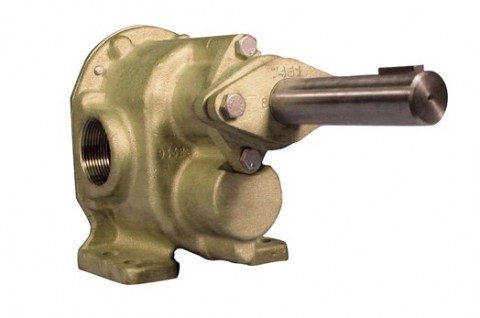PT FTS Indonesia
Pump housings and gears are made of top quality bronze, shafts are 303 stainless steel. Bearings are made of high performance carbon-graphite material selected for wear resistance and long service life. Gear pumps are positive displacement pumps. Each shaft revolution displaces a definite amount of liquid relatively unaffected by the backpressure in the discharge line. Shaft speed and flow are directly proportional.
Gear Pumps N13500
FEATURES
- Bronze Corrosion Resistant Castings
- Stainless Steel Shafts & Fasteners
- Self-Lubricating Carbon Bearings
- Packing (Braided Acrylic yarn with special lubricant and Graphite)
- Optional fluoroelastomer Lip Seal
- For Mechanical Seals, see Models N13HDM
DRIVE
Either direct drive with flexible coupling or pulley drive can be used. For pulley driven pumps a pillow block bearing must be used at the drive shaft end to absorb the belt forces. The drive shaft is sufficiently long enough to accommodate a pillow block in addition to the pulley. Correct alignment is absolutely essential for satisfactory pumplife. Recheck alignment after the piping has been connected to the pump.
LIQUIDS & TEMPERATURES
Service life will be increased substantially if the liquid pumped is clean and has a lubricity value. These pumps have extremely close tolerances. Fine abrasives like sand, silt, or powders in suspension will destroy pumping ability. Liquids compatible with bronze, stainless steel and the acrylic graphite packing can be pumped. Optional S5 fluoroelastomer lip seal has Polytetrafluoroethylene (PTFE) backup and stainless case. Solvent resistant packing and Polytetrafluoroethylene (PTFE) packing are also available. See a chemical compatibility table or check factory. When possible, flush the pump with water after using. Temperature extremes are detrimental to service life and should be avoided. Basic metals of construction allow temperature range of -40°F to 400° F. the acrylic graphite packing is rated to 500°F, the fluoroelastomer lip seal is rated to 300°F. Freezing liquid in the pump can deform or damage the pump. Viscous liquids such as molasses or oils require a lower pumping speed, in extreme cases as low as 200 R.P.M. Consult factory for recommended speeds and increased horsepower requirements. Large suction lines are required to prevent cavitation which can cause pump destruction. Liquids with specific gravities heavier than water such as dry cleaning fluids require an increase in motor horsepower directly proportional to the increase in specific gravity over water.
SUCTION LIFT
A rotary gear pump is capable of lifting water on the suction side as high as 20 feet. Though gear pumps are self-priming, a foot valve is recommended. For pumping water directly from streams or ponds, a wire mesh strainer must be used at the beginning of the suction line to prevent stones from entering the pump. Strainer and foot valve are commercially available as combination units.







